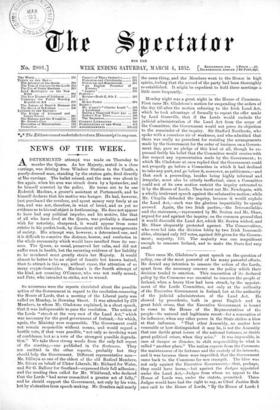Monday night was a great night in the House of
Commons. First came Mr. Gladstone's motion for suspending the orders of the day till after the motion referring to the Irish Land Act, which he took advantage of formally to repeat the offer made by Lord Granville, that if the Lords would exclude the judicial administration of the Land Act from the scope of the Committee, the Government would not press its objection to the remainder of the inquiry. Sir Stafford Northcote, who spoke with a conscious air of weakness, and who admitted that there was really no precedent for resisting the arrangements made by the Government for the order of business on a Govern- ment day, gave no pledge of this kind at all, though be ex- pressed feebly his belief that the Committee would receive with due respect any representation made by the Government ; to which Mr. Gladstone at once replied that the Government could not properly go before a Committee in which it had declined to take any part, and go before it, moreover, as petitioners,—and that such a proceeding, besides being highly informal and irregular, must also be utterly ineffectual, since a Committee could not of its own motion restrict the inquiry entrusted to it by the House of Lords. Then burst out Mr. Newdegate, with a wholly irrelevant speech against the substantive motion; while Mr. Chaplin defended the inquiry, because it would explode the Land Act,—such was the glorious impartiality he openly avowed. Again, the two Irish parties,—the Irreconcilables and the statesmen,—represented by Mr. Sexton and Mr. Shaw, argued for and against the inquiry, on the common ground that it would discredit the Land Act, which Mr. Sexton wished, and Mr. Shaw eloquently protested against. The Conservatives, who were led into the division lobby by two Irish Irreconcil- ables, obtained only 167 votes, against 300 given for the Govern- ment; majority, 133. The majority was one magnificent enough to reassure Ireland, and to make the Peers feel very small.


































